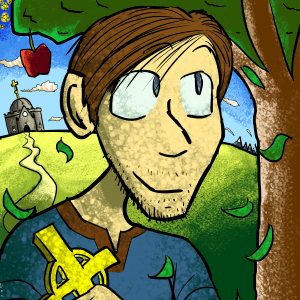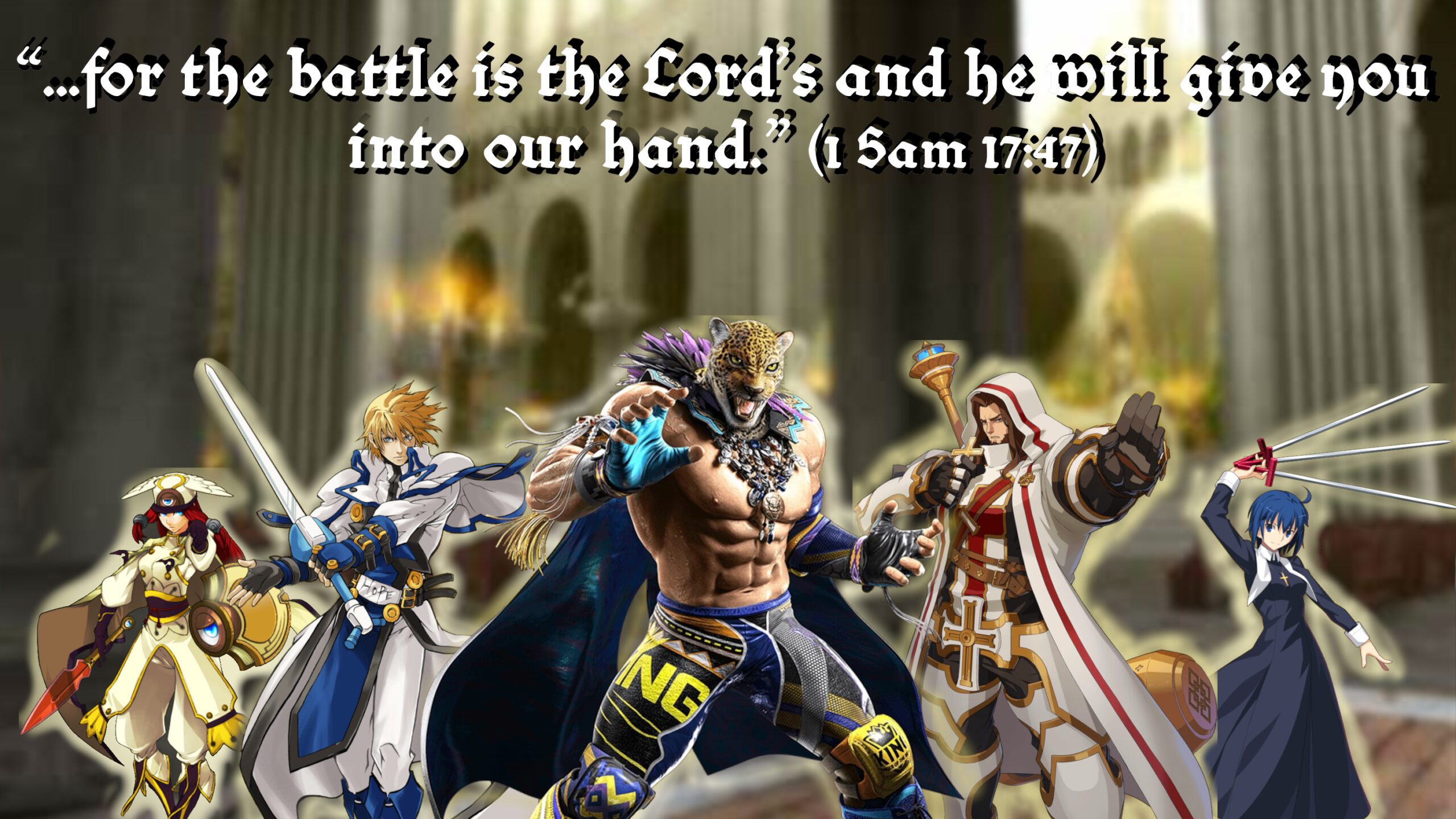
It’s no secret that I really enjoy fighting games. Between the in-depth fighting mechanics, blood pumping music, and larger-than-life characters, there’s a lot to keep you coming back for more. The third aspect I cited, the characters, seems to be the most popular aspect among fighting game players as a whole. Developers make millions selling extra characters as downloadable content, after all. So as a tribute to the genre, with a little bit of Catholic Game Reviews’s special flavor mixed in, PeaceRibbon and I have created a list of the top 10 most Catholic fighting game characters.
Before we begin, a few quick disclaimers. PeaceRibbon and I are familiar with many fighting games, but there are probably far more that we aren’t even aware of. So naturally there might be a few omissions that we simply never came across in our research. We also limited ourselves to 1 character per franchise so we could showcase a wide variety of games. Additionally, there are a few characters that aren’t technically Catholic (usually because they are from a non-earth fantasy setting) but if there are enough references to Catholic ideas in their visual design and backstory, we’re counting them. 10 combatants enter the ring, but only one will rise to the top.
#10 – Felicia (Darkstalkers)

Written by TheGoodHoms
Starting things off, we have one of the most popular recurring characters in the Darkstalkers franchise. Felicia is a half-human half-cat monster girl raised by nuns who dreams of being a famous dancer. She does not pursue the path of stardom vaingloriously, but out of a desire to promote friendship between humans and Darkstalkers, which feels very fitting for a character raised in a religious environment. Her Catholic background also comes full circle at the end of Vampire Savior, the last game in the Darkstalkers series, where she uses the money she made as a dancer to open a brand new orphanage. She even helps run this orphanage as one of the sisters.
A character raised by nuns with noble aspirations who becomes a religious sister herself at the end of her arc: sounds like everything we’d want in a Catholic fighting game character, right? Well unfortunately for sister Felicia, there’s one big issue keeping her at the bottom of our list. 95% of the time, Felicia is one of the most scantily clad characters in the Darkstalkers cast. So despite all of Felicia’s good qualities, her oversexualization often spoils the end result. Even so, on the rare occasions when we do see Felicia don her habit, it is a welcome sight.
#9 – Orie Ballardiae (Under Night In-Birth)
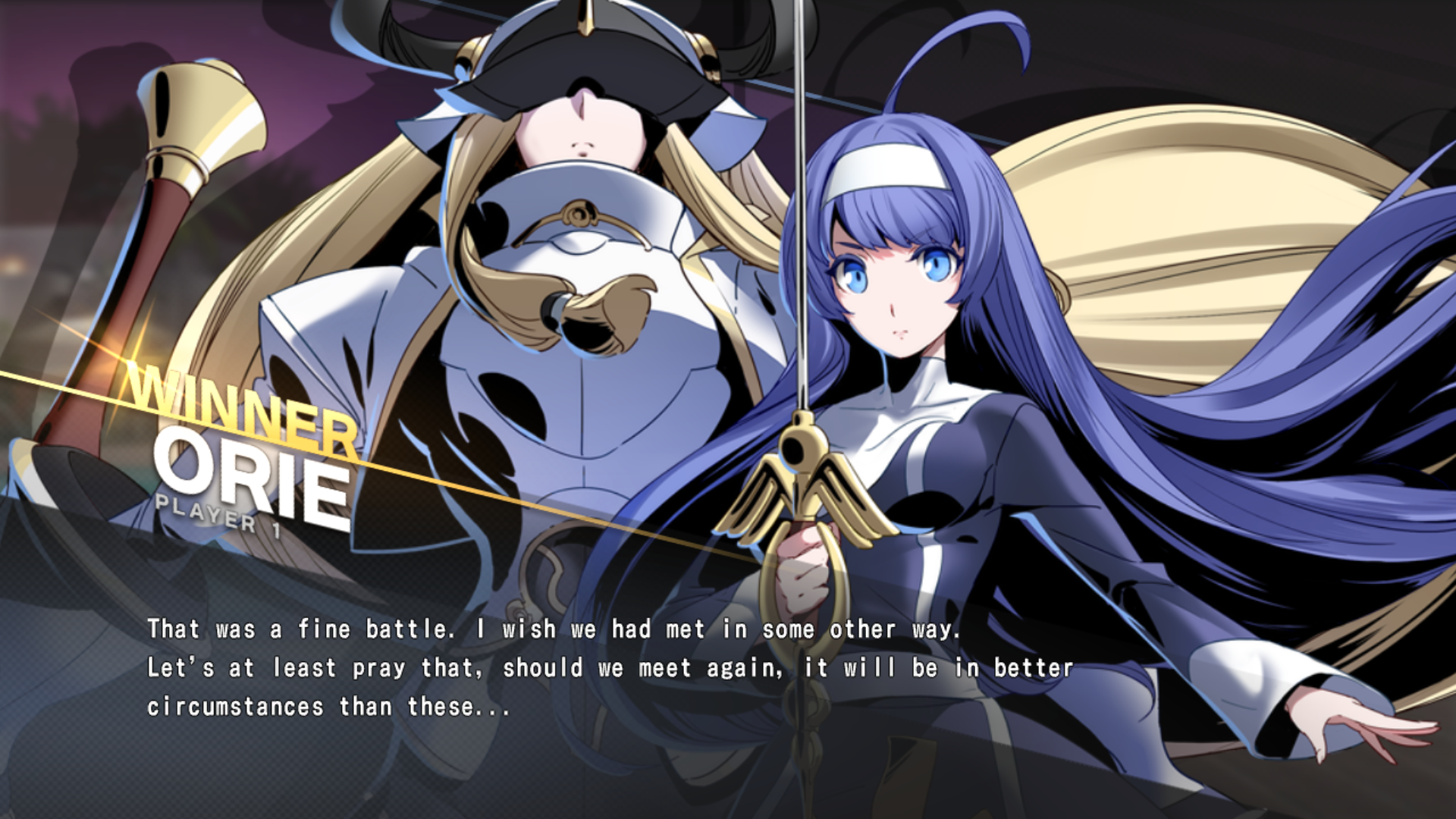
Written by PeaceRibbon
Orie is an example of our inclusion of characters who aren’t actually Catholic but have strong enough thematic ties to be included on this list. Debuting in the first Under Night In-Birth game, Orie is a member of an organization called Licht Kreiss. Said organization works as an international charity organization (which has cathedrals for some reason) by day, but beneath the surface acts as a force to contain the Hollow Night and protect people from void attacks. You also know this is an anime game because their leader kicked out all of the men because of a single male defector and it is now an all-female group.
As for Orie herself, she serves the story of UNI as a mid-level warrior of her organization sworn to destroy the voids so that the tragedy that took her parents’ lives is not repeated with others. What really puts her on the list compared to what few alternatives we had is her virtue, as she is easily the most heroic character in the series. Orie is selfless, merciful, and courageous: less interested in killing her opponents than incapacitating them and charging bravely into fights against some of the most dangerous characters in the series, all in the name of justice. You could easily have seen an alternate timeline where she just was a religious sister and her character would remain almost completely intact. Of course it’s because you have to dig through so many layers of fantasy that she’s only number 9, but Orie deserves at least that much for being among the most flattering Catholic-adjacent characters in fighting games.
#8 – Tsubaki Yayoi (Blazblue)
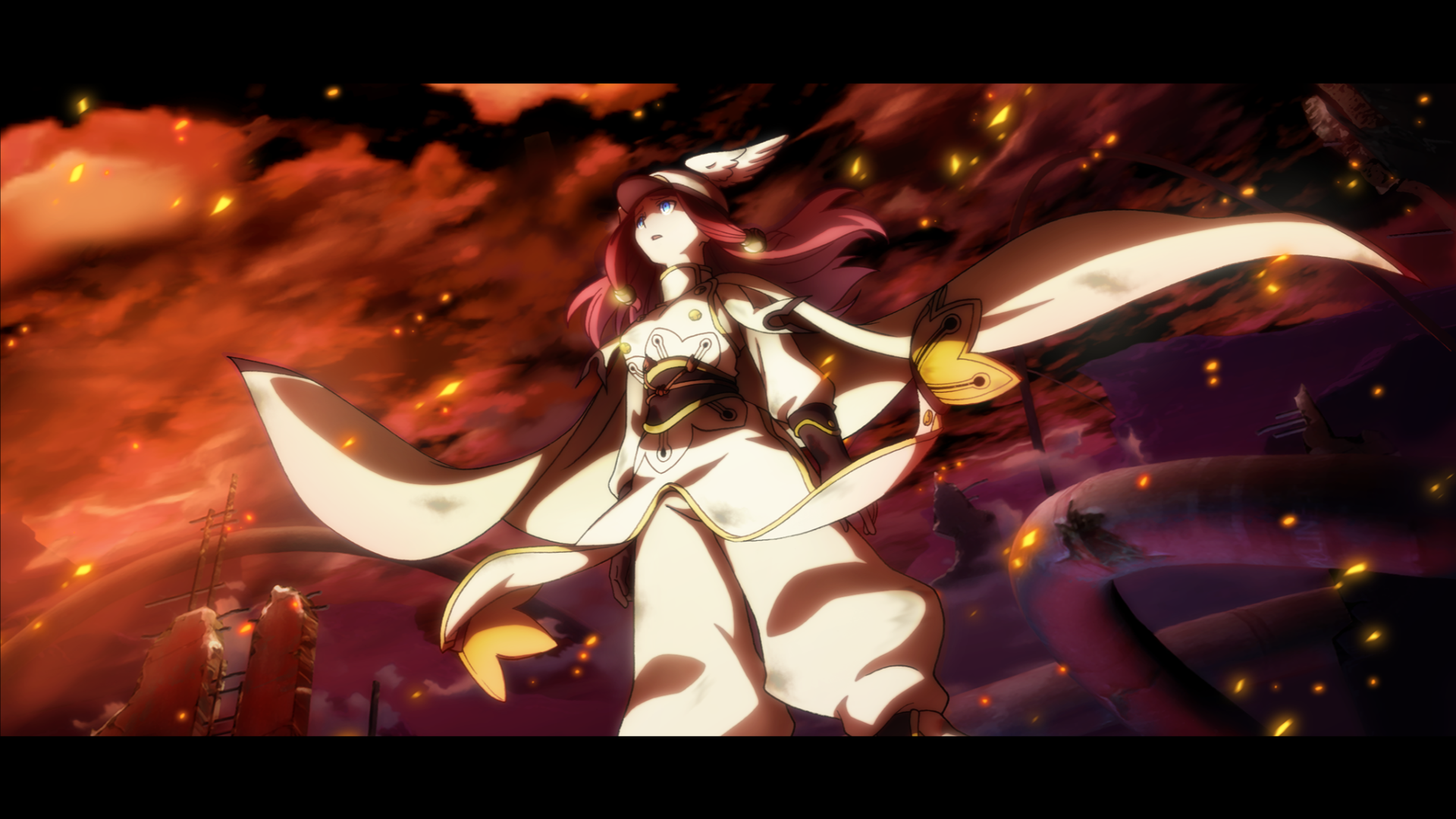
Written by PeaceRibbon
First appearing in Blazblue Continuum Shift, Tsubaki represents yet another character whose Catholicism is rather debateable, but there are some connections that are worth giving credit to. The true faith is implied to be alive to some extent in the Blazblue universe; the character who raised the main trio was a nun, and one of those three, Noel Vermillion, becomes a nun to watch over the same church at the end of Central Fiction. But the references are so veiled that for the most part it’s hard to assume anything in particular about Tsubaki’s faith. Ms. Yayoi probably wouldn’t have made the list on her story alone, because while she is quite virtuous and has a strong sense of justice, her story is actually about how the reigning government abused that sense of justice to make her into a villain (Albeit mind control was very definitely involved, and she breaks free for the final leg of the series. Please don’t make me try to explain this in more detail, Blazblue lore is insane).
What puts Tsubaki on the list is her presence in the versus mode, as more often than not battles against her are framed with heavy allusion to a confession, possibly one given before an execution. She starts battles with voice lines like “Face your sins. I will guide you,” and ends them with lines like “I accept your sins,” and “I’ll give you time to pray.” Additionally, many of her special moves’ names are in latin with tons of liturgical references. Sanctus Aequum, Agnus Dei, Benedictus Rex, Aequum Eleison, Lux Aeterna, and so on. In this way Tsubaki serves a valuable purpose of being a source of tangential learning, where much of her presentation in the game serves to point the player towards investigating where her many quotes find their roots, if the player is paying attention that is. Perhaps a less flattering character than our previous entry, but the stronger connections through gameplay earn her just a little bit higher of a spot.
#7 – Shiro Tokisada Amakusa (Samurai Shodown)
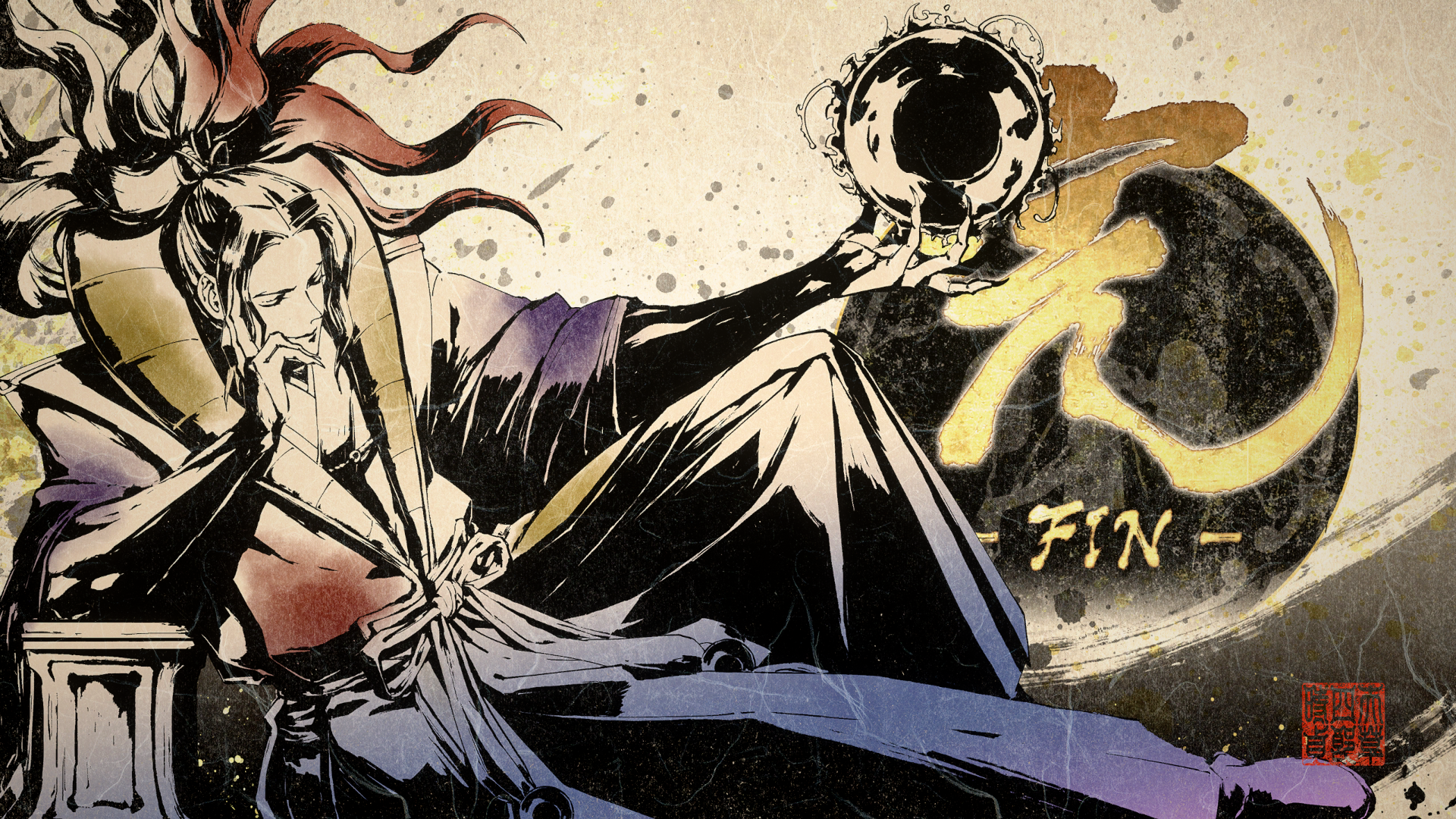
Written by TheGoodHoms
Those of you familiar with the Samurai Shodown games are probably confused as to why we would put the series’s most iconic antagonist on this list, but I promise with a little historical context the connection will become clear. Shiro Tokisada Amakusa is actually based on a real person of the same name – for the sake of distinguishing him from his fictional counterpart, I will refer to him by his baptismal name, Jerome. Jerome was a Catholic ronin who became the leader of the Shimabara Rebellion in 1637, an uprising of Japanese-Catholic peasants against the local daimyo, Mastukura Shigemasa, who was starving them to death through abusive taxation policies. Though Jerome and the peasants fought bravely, the rebellion was ultimately crushed after months of struggle against the forces of the Tokugawa Shogunate. Jerome was beheaded by the shogunate alongside 37,000 rebels, and according to some reports died cursing his enemies Jacques de Molay style.
Since the Shimabara Rebellion was not primarily motivated by the persecution of Japanese-Catholics (though it was a contributing factor) and because Jerome allegedly did not accept his death in a Christ-like manner, he is not considered a martyr by the Catholic Church. But I don’t think it’s unreasonable to consider him a hero for standing up to the injustices of a corrupt daimyo. Samurai Shodown, however, sees Jerome as a violent disruption of the relative peace Japan enjoyed during the Edo period. In the first game in the series, Shiro Tokisada Amakusa is brought back to life as an evil sorcerer by a demon named Ambrosia to destroy the world.
If the story ended there I probably wouldn’t have considered Amakusa for this list, but if the player finishes the game as Galford it is revealed that Amakusa was not acting entirely of his own will while under Ambrosia’s control. This seed of redemption is expanded upon in later games in which Amakusa is resurrected once again, only this time with his good and evil personas split into separate entities. The good Amakusa is shown to be far more noble than his evil counterpart, though there is still some lingering hatred towards the Tokugawas. So overall while Shiro Tokisada Amakusa might not be a model of Catholicism like other characters on this list, his interesting historical roots and redemptive story arc do enough for me to justify his inclusion.
#6 – Ky Kiske (Guilty Gear)
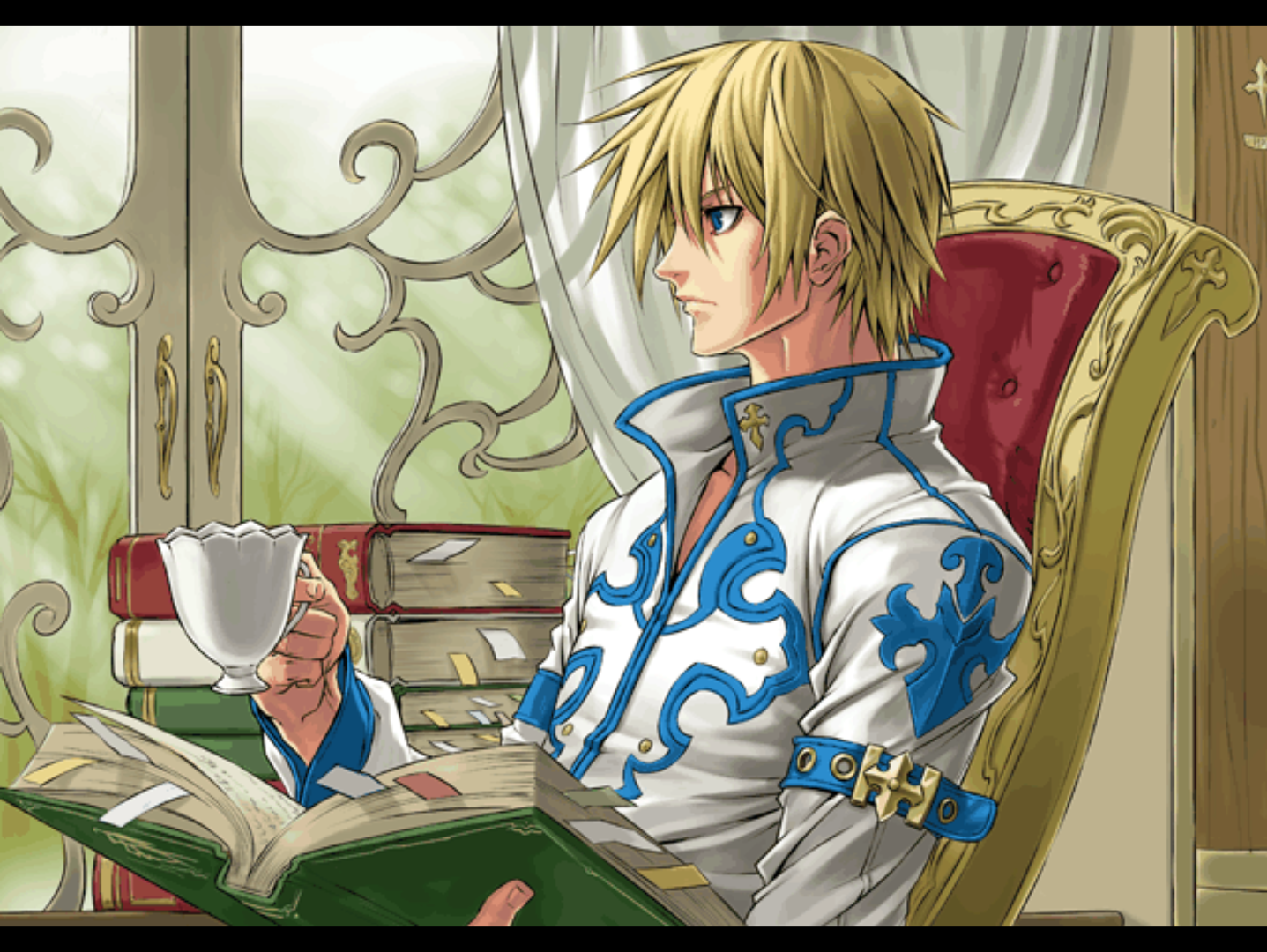
Written by TheGoodHoms
As deuteragonist of the most heavy metal fighting game series ever created, Ky Kiske is the ideal knight trope personified and turned up to eleven. Orphaned as a child, Ky was raised by the Sacred Order of Holy Knights and was a key figure in ending humanity’s 100-year war against the Gears, an artificial race of magically enhanced monsters. In the series proper he has continued to work as an international peacekeeper and later king of Illyria, always first in line to confront whatever big bad villain shows up to destroy the world in each game. Ky has also been a very religious character since his debut, with crosses adorning almost every outfit he has ever worn. His strong sense of justice and honor is often attributed to his faith in God.
Part of me wants to put Ky even higher on the list for possessing so many virtuous characteristics, but there are some elements introduced later on in the Guilty Gear series that hold him back. While Ky is still the noble soul he always has been, there’s also been a creeping sense of moral relativism in the series that weakens Ky’s devotion to justice overtime. Additionally, while Ky is without a doubt a Christian, I don’t think it’s ever been confirmed if he is a Catholic specifically (however the fact that he’s ethnically French makes it more likely than not). Regardless of my concerns, Ky still remains a shining beacon of hope in a world filled with chaos and destruction.
#5 – Ciel (Melty Blood)
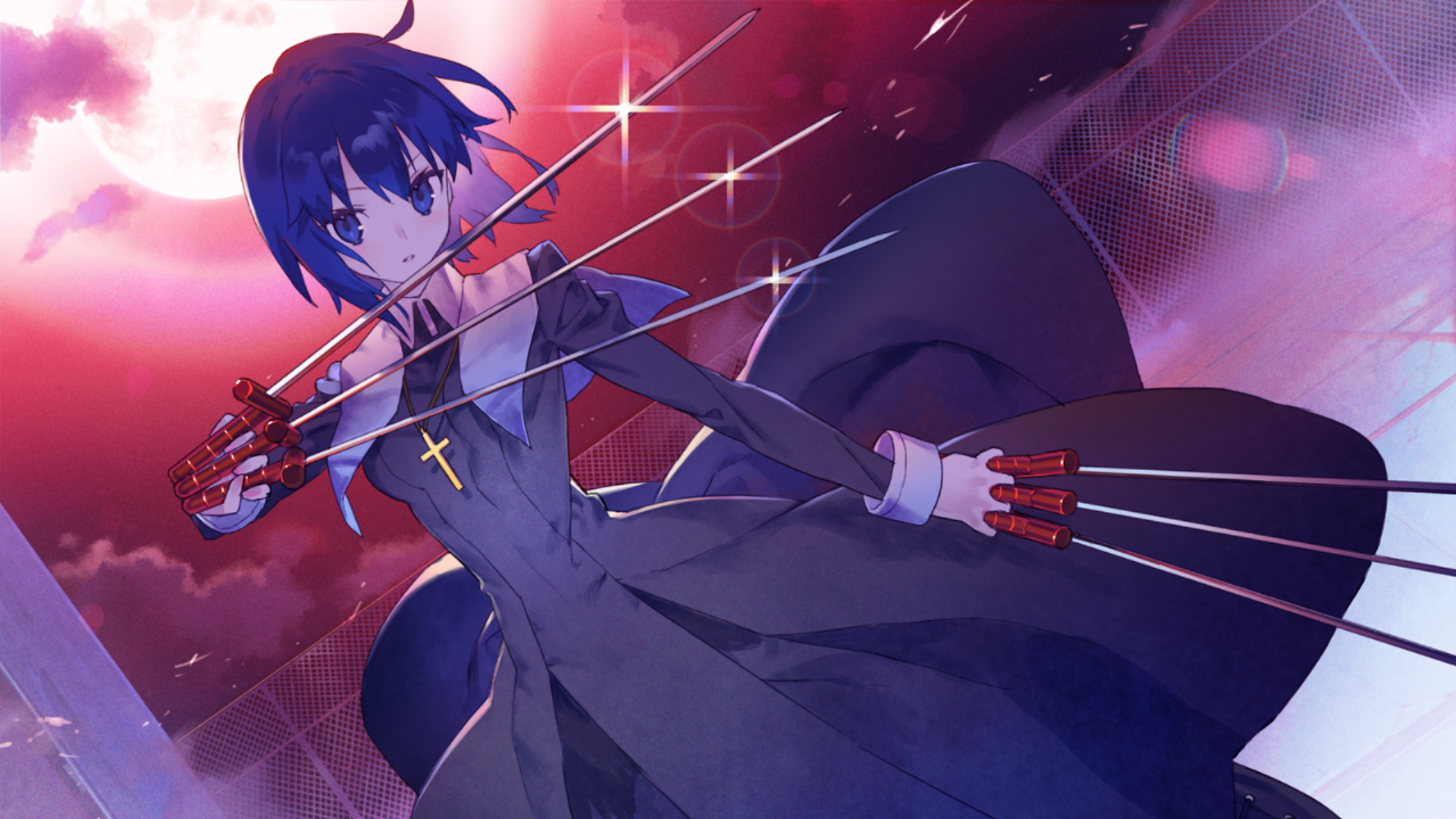
Written by PeaceRibbon
Hailing from the Melty Blood series of fighting game spinoffs, Ciel is probably the most iconic religious sister in the fighting genre. She also happens to be the spiritual predecessor of Orie, since Under Night was essentially French Bread’s solution to licensing expiry up until they wound up managing both series’ development. Despite how ridiculous Melty lore can get, Ciel’s story is thankfully not that complicated. Once an ordinary girl, her life was changed overnight when a “reincarnating” vampire (seen in-game as Roa) possessed her and committed a massacre, and in the aftermath she found herself cursed with both an undying body and the memories of that tragedy. Ciel thus joined a secret arm of the Church tasked with protecting humanity from vampires in order to kill Roa, both to regain the fullness of her humanity and find interior absolution.
It’s quite a dramatic set up for such a simple-looking character, but even despite the hyper-fantastical side of Ciel, what I like about her is how earnest her portrayal is. Within Melty Blood’s cast of morally dubious characters she is a ray of light who’s always looking to put herself on the line for the sake of others. While her internal struggles are a bit overly self-flagellating, the penitential spirit which proceeds from it can be quite inspiring in its own right. Her weapons also canonically get their power from the scriptures (the pages of which can be seen in-game during particularly dramatic attacks), and that’s just so neat. Overall Ciel just exudes a cool and heroic persona grounded in faith, and it makes me happy that she’s as recognizable as she is. The only reason she isn’t any higher is that the Type-Moon series has generally taken liberties with the Church’s depiction that I’m not a huge fan of, and I’m not about to give them TOO much credit even though the depiction is generally positive in Melty Blood.
Speaking of vampire hunters…
#4 – Richter Belmont (Super Smash Bros.)
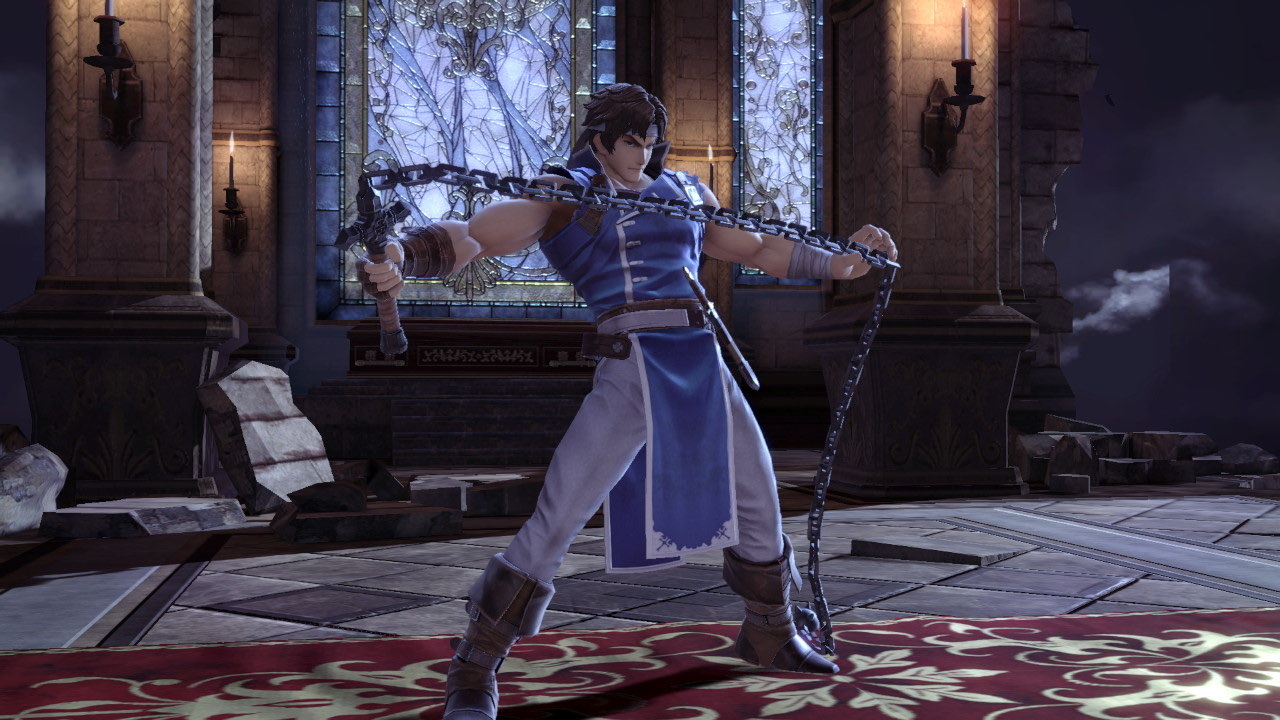
Written by TheGoodHoms
Is using Super Smash Bros. cheating? Probably, but it’s our list and I say if it’s a fighting game it’s on the table. Hailing from the Castlevania series, Richter is one of the most powerful vampire hunters in the Belmont family legacy. Armed with a magic whip, axes, crosses, and holy water, he is well equipped to face down Dracula’s army of monsters and spirits as his ancestors did many times before. Combine all that with a lively personality and a strong sense of justice, and it’s no wonder Richter is a fan favorite among Castlevania’s many Belmonts.
All that being said, I’m sure many will question why we chose Richter over his more iconic ancestor, Simon Belmont, who also appears in Super Smash Bros. While there is enough evidence to assume every Belmont is Catholic, in Castlevania: Rondo of Blood Richter’s Grand Cross super move takes the form of a giant crucifix. This makes Richter’s connection to Catholicism slightly more apparent than most other members of the Belmont family (at least among the ones that have been in fighting games anyway). Either way, the fact that such a positively portrayed Catholic like Richter found his way into the biggest fighting game of all time cannot be understated. I’d be absolutely crazy if I didn’t include him in the top 5.
#3 – King (Tekken)
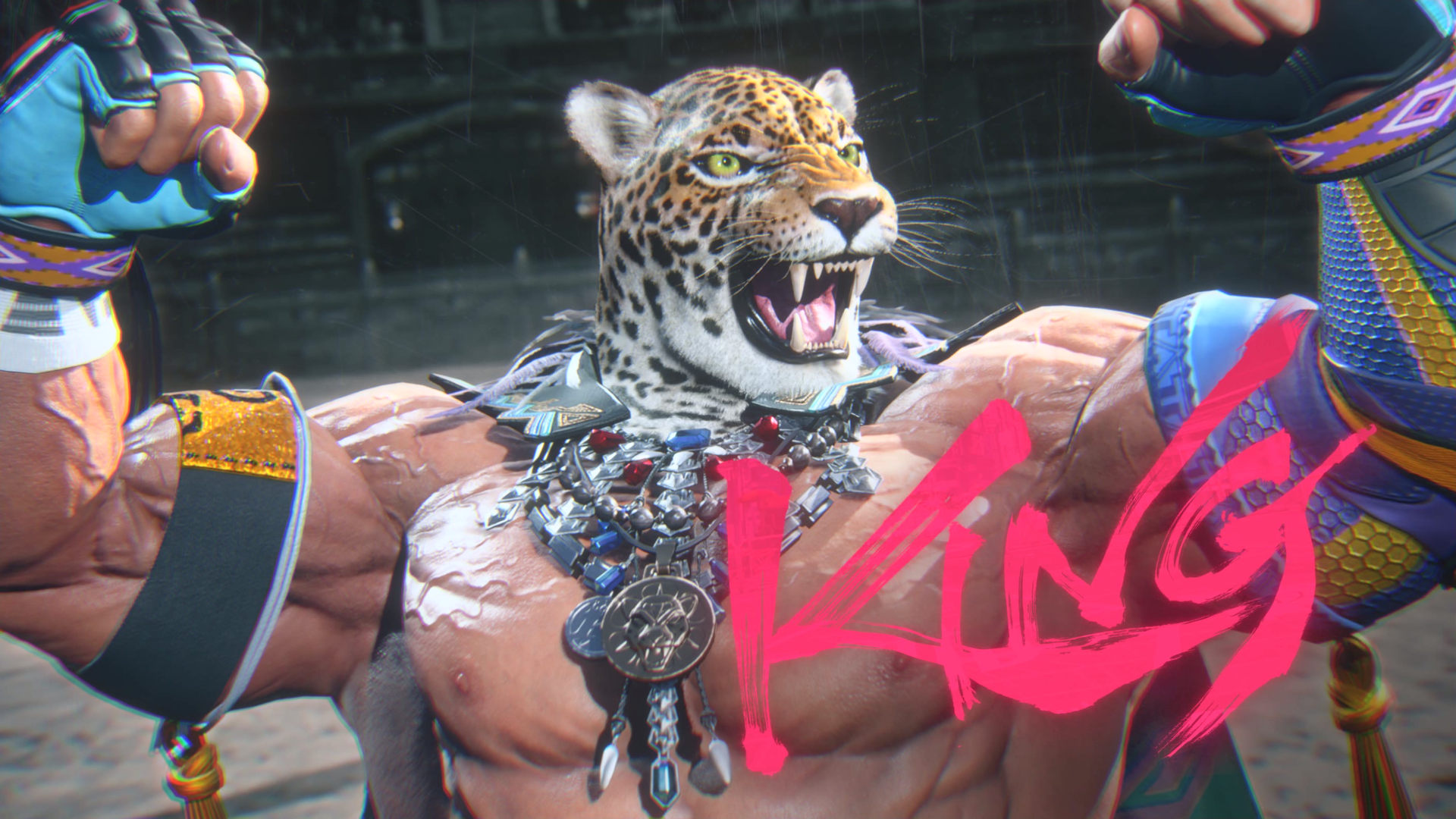
Written by TheGoodHoms
Tekken’s premier grappler archetype and one of the most iconic characters in the series, King is a Mexican priest who became a jaguar-masked luchador to help support his church’s orphanage. The fact that one of the most popular Tekken characters is a Catholic priest is already awesome, but what makes it cooler is that he’s based on a real person! King’s background is a direct homage to Fr. Sergio Gutierrez Benitez, better known by his ring name: Fray Tormenta, who is cited as the inspiration of many Lucha Libre characters in video games and movies.
So why isn’t King number 1 on the list? He’s literally a priest! Well the progression of the Tekken series unfortunately leads to some ambiguity regarding King’s status as a Catholic priest in later games. During the events of Tekken 3, King is killed by the game’s final boss and his mantle is passed on to one of the orphans he raised. While it is reasonable to assume King II is probably Catholic since he continues to support the same orphanage, whether or not he is also a priest remains unknown. Ambiguities about King II aside, there was no way King wasn’t going to make the top 3. A fighting character inspired by an actual luchador priest is just too good to not celebrate.
#2 – Crusader (DNF Duel)
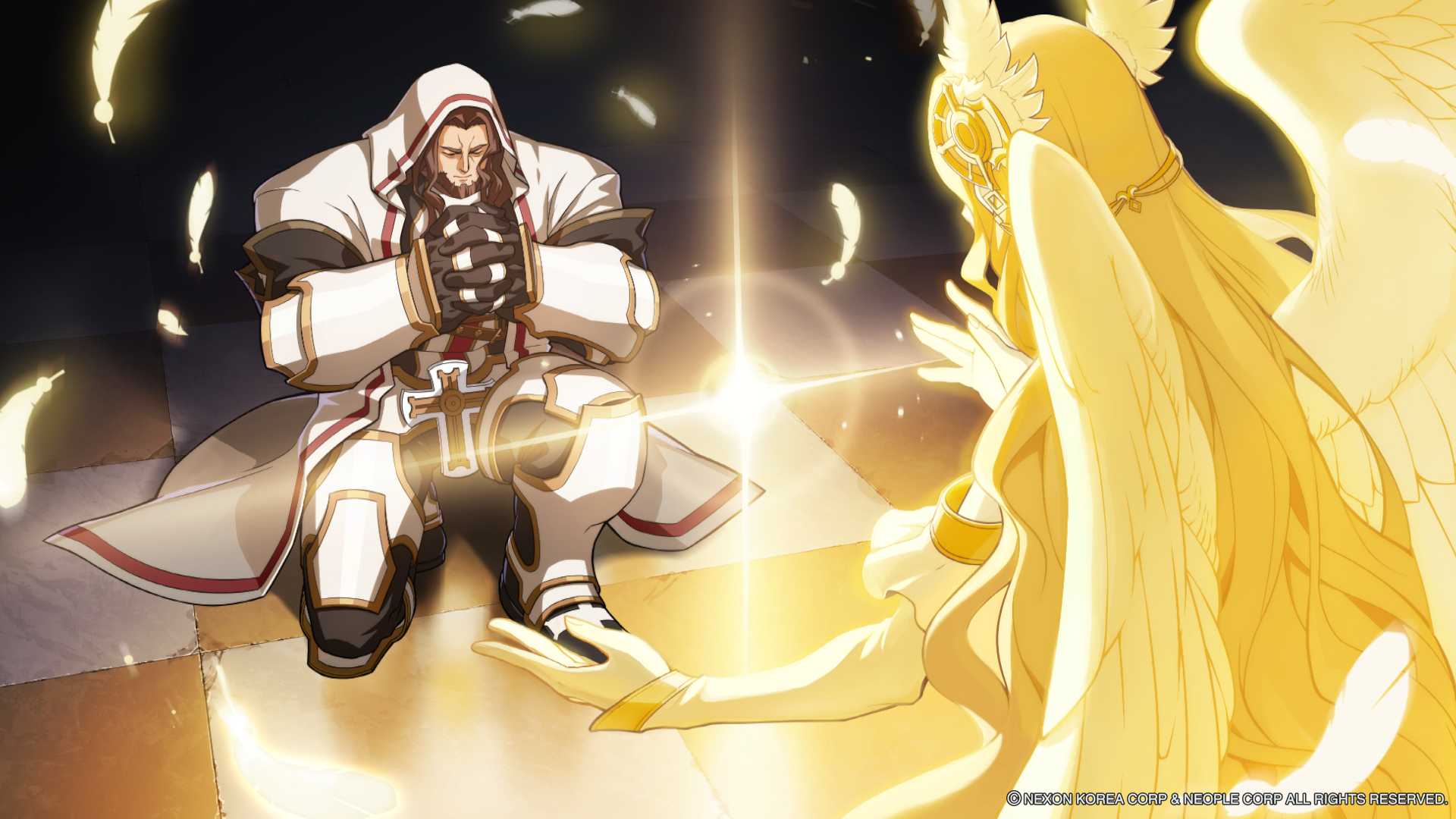
Written by PeaceRibbon
Let’s be honest, if Catholicism and fighting games are mentioned in the same sentence, chances are the modern aficionado thinks of Crusader. As mentioned in the review of DNF on this site, he is incredibly interesting in this regard because of his Christian imagery largely being a rule-of-cool shorthand for a character who is otherwise of a fantasy faith. I guess there really is a point where you borrow too much of the inspiration and sublimate your original lore to its real-world analogs. Crusader himself isn’t even a hard character so much as he is a representation of what a given user of his class in the MMO might imagine of their avatar.
Even so, the mark of Catholicism is unmistakable on his legacy, and it’s not hard to see why. His design draws clear inspiration from The Poor-Fellow Soldiers of Christ, and his hammer is historically accurate to the blunt weapons a priest pressed into military service would have actually used. His overwhelming kindness and humility puts basically every other character in the setting into perspective, even (and perhaps especially) the Inquisitor and Monk characters who are similarly inspired by Christianity. And let me tell you, fighting games have never been so fun to me as landing weighty blows and deliberate combos while bathing the battlefield in holy light. Crusader was never going to be #1 on this list on account of his faith technically being that of a fictional world, but it’s going to take a top-class character to knock him from the silver podium. His Catholic elements ultimately aren’t just window dressing but truly sing beautifully in practice, and he’d be a far lesser character without them.
#1 – Elias Patrick (Rage of the Dragons)
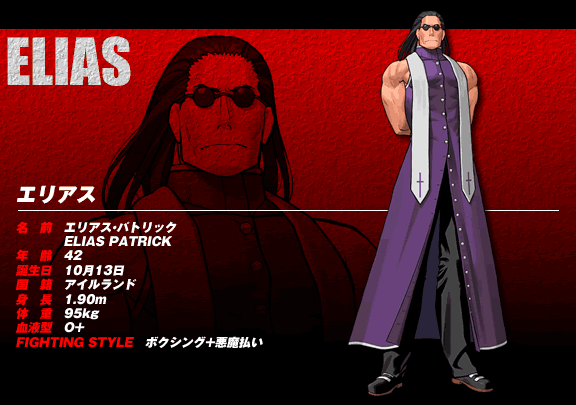
Written by TheGoodHoms
Some might call it bold to put a character from a lesser known Neo Geo title at number 1 on this list, but Elias really does have everything you could ever want in a Catholic fighting game character. Elias is an Irish priest who reconverted to the faith after spending time in prison for a murder he did not commit. As a disciplined man of the cloth he has a very stern demeanor, but he’s also very compassionate as seen in his relationship to his tag partner, Alice Carrol. Alice is a young girl possessed by an evil spirit that gives her psychic powers she can’t control. Elias and Alice enter the fighting tournament to defeat the game’s main antagonist, Johann, who is connected to the malicious spirit tormenting Alice.
With a story full of faith, virtue, and redemption, what more can I really say about Elias? He looks really cool in a cassock? The depiction of Catholicism through Elias’s characterization is among the most flattering on this list, and unlike Crusader there’s no “fantasy faith” asterisk holding him back. I only hope the upcoming re-release of Rage of the Dragons comes out sooner than later so that more people will be introduced to this peerless pugilist priest.
A huge thank you to PeaceRibbon for co-writing this article and to readers like you whose interest in our work keeps this site going. If you would like to see more articles like this one in the future, please consider supporting Catholic Game Reviews on Patreon where you can gain access to our Discord server and make recommendations for future projects. God bless, and fight on!
